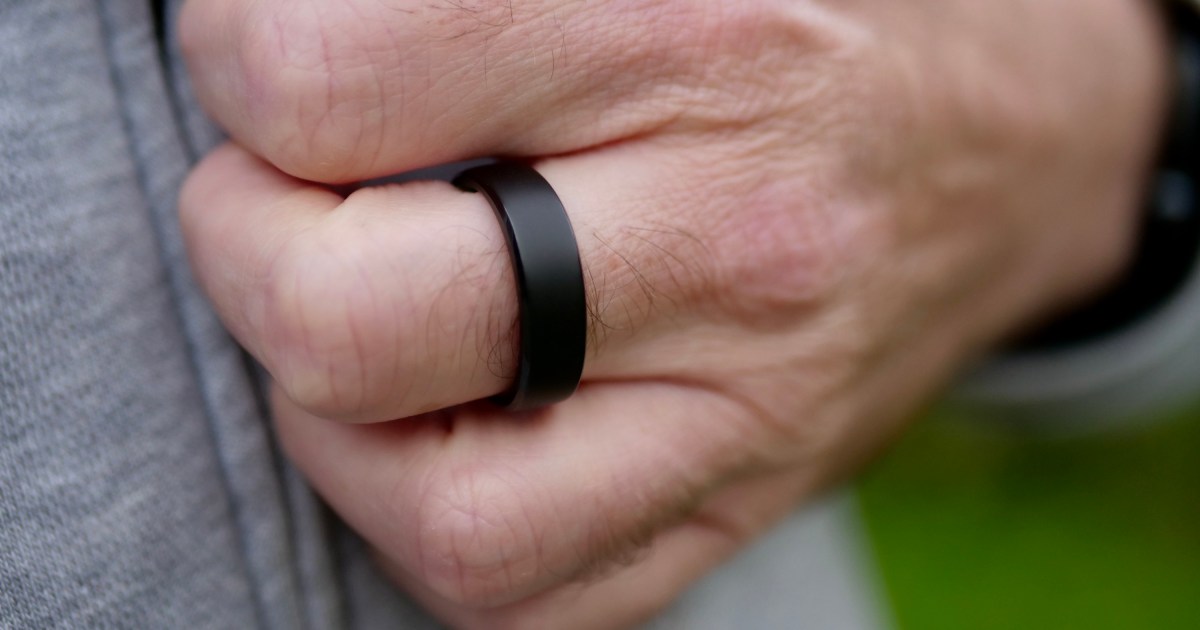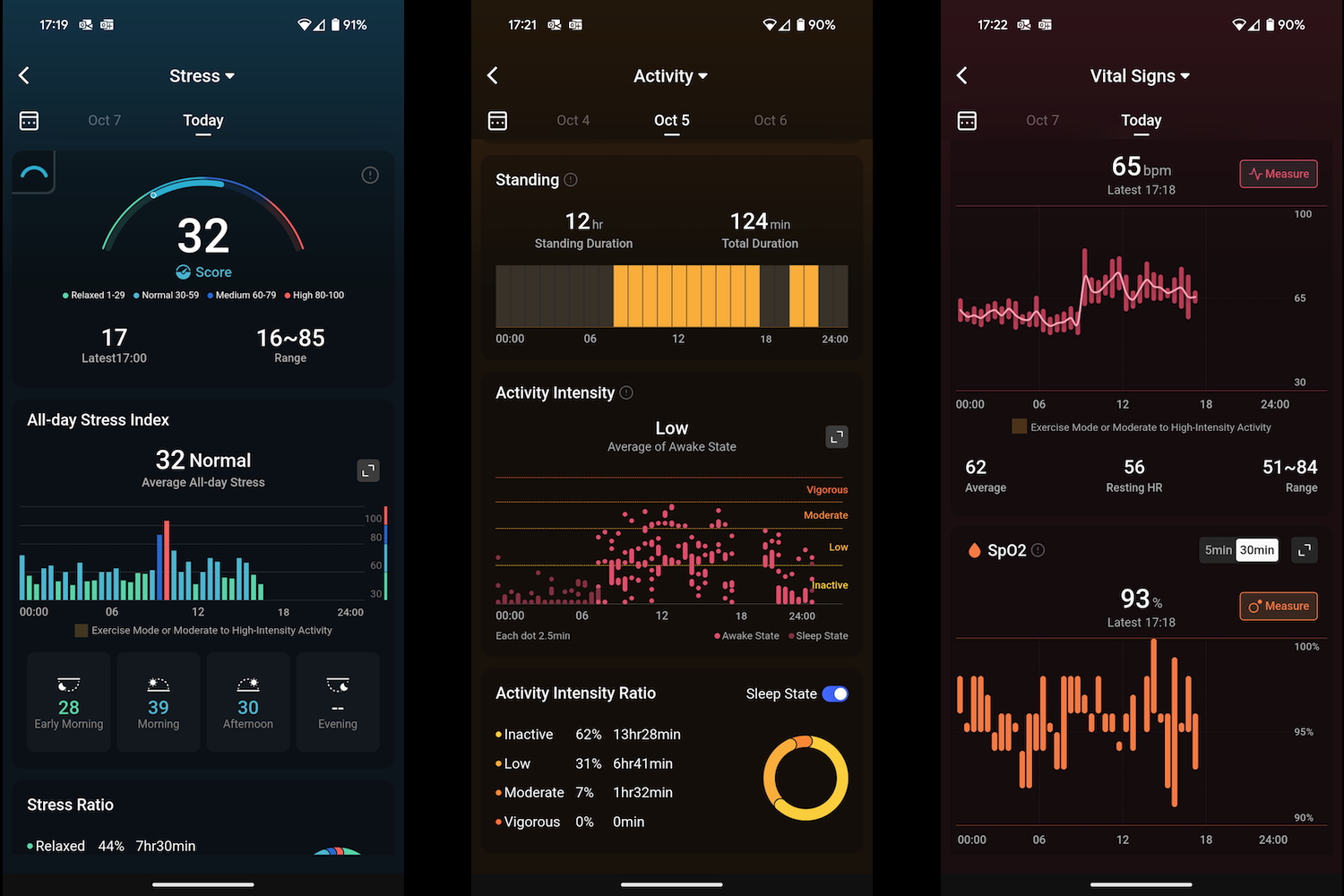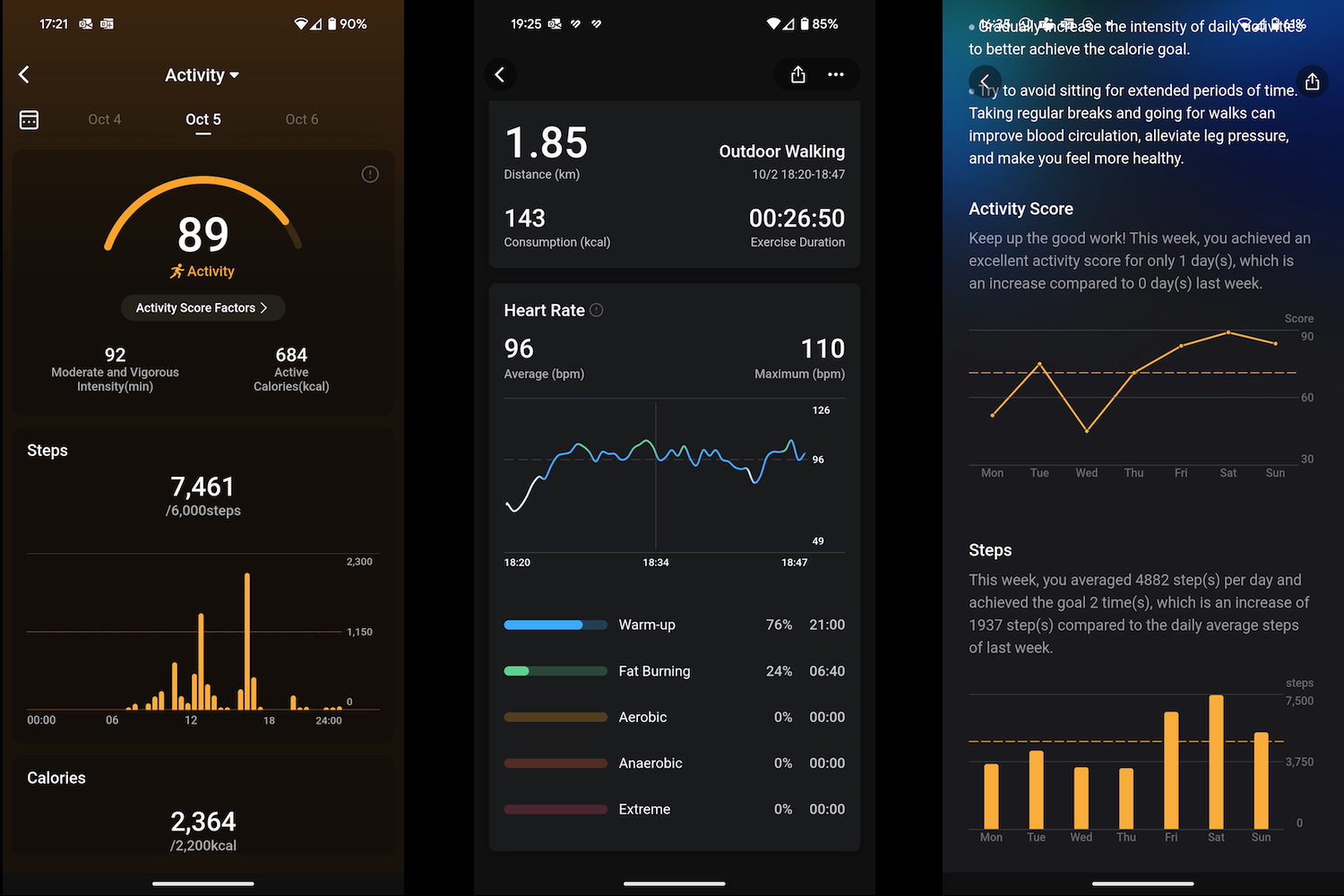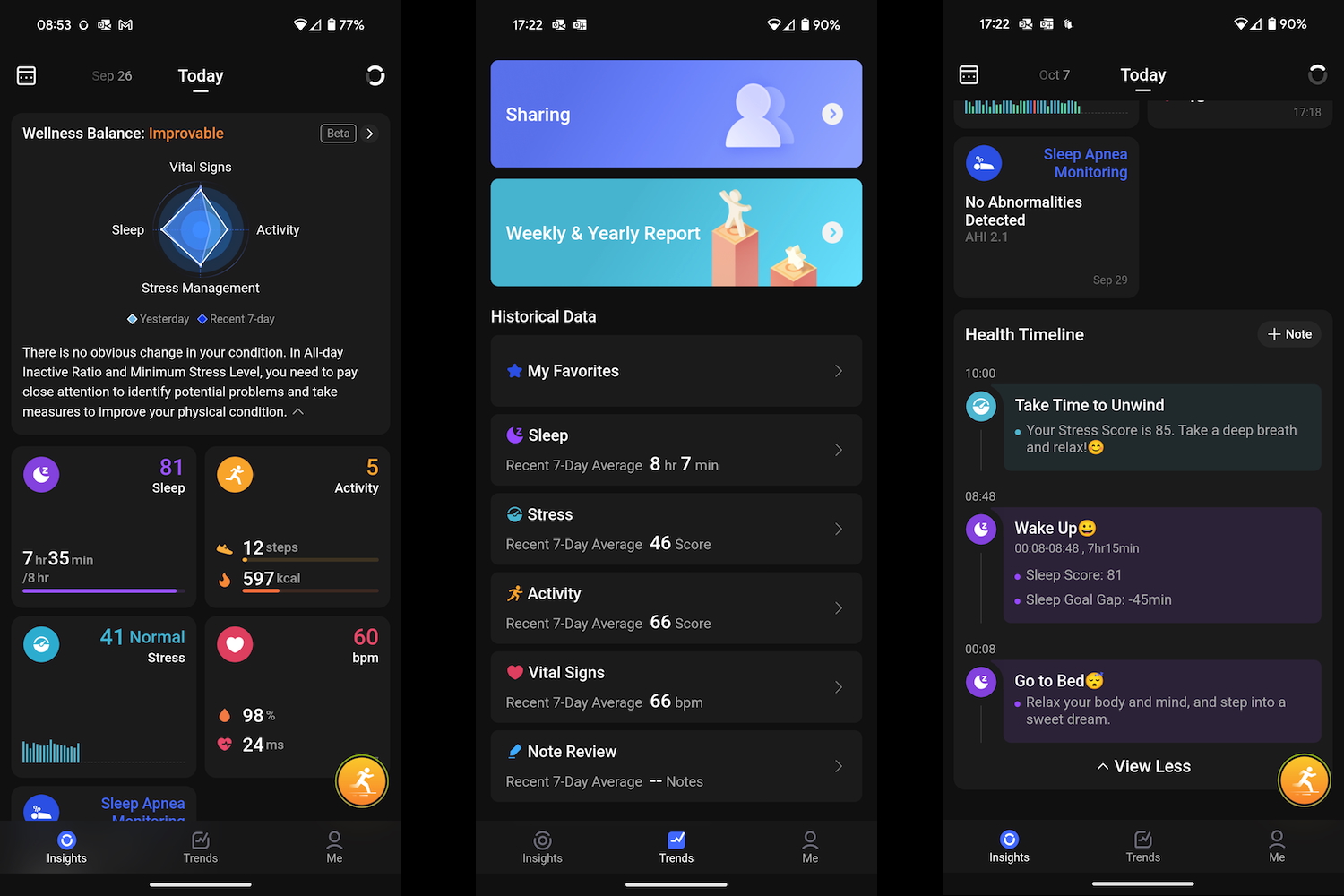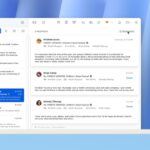RingConn Gen 2
MSRP $299.00

“The RingConn Gen 2 is a comfortable, light, well-designed smart ring at a fantastic price.”
Pros
- Thin, slim, and light
- Sleep apnea monitoring
- At least six days battery life
- Convenient travel charger included
- No subscription
Cons
- No automatic activity tracking
- Limited workout tracking
- App lacks informative analytics
Smart rings are an exciting new generation of wearable health trackers, and the RingConn Gen 2 is one of my most anticipated to wear after loving the way it looked when I first took it out of the box.
However, there have been a few disappointing smart ring releases recently, and the Samsung Galaxy Ring hasn’t quite lived up to expectations yet. Now that the RingConn Gen 2 is on my finger, have I been happy to keep it there or keen to take it off?
RingConn Gen 2: specs
| Materials | Titanium alloy
PVD coating Medical-grade epoxy |
| Weight | 2-3 grams (depending on ring size) |
| Dimensions | 6.8mm wide, 2mm at its thinnest |
| Durability | IP68 (up to 100 meters) |
| Connectivity | Bluetooth 5.0
Low-power Bluetooth module |
| Compatibility | Android and iOS |
| Price | $299 |
RingConn Gen 2: design

When I received the RingConn Gen 2, I was so impressed with how it looked and felt that I wrote a whole separate story about it. It then took a while for me to put on the smart ring to test it, and when I synced it to my phone for the first time, I wondered if my initial positivity would continue. The good news is that the RingConn Gen 2 is so light and comfortable that I have forgotten I’m wearing it.
My size 11 smart ring weighs just 2 grams, is 2mm thick at its thinnest point, and is 6.8mm wide. It’s considerably more compact than the first RingConn Smart Ring, but it retains its unusual “squircle” shape and is far less pronounced. The ring is made of titanium with a physical vapor deposition (PVD) coating. It’s waterproof to 100 meters and has an IP68 dust and water resistance rating.

I’ve worn it for two weeks, and while I haven’t been rock climbing or anything like that, the matte black finish is still unmarked. There are two dome-like nubbins on the epoxy resin underside of the ring for the sensors, but I have not noticed them, and I’ve not felt any need to take the RingConn Gen 2 off because it was uncomfortable. It’s worth mentioning that I wear a size 11 Oura Ring as well, and the size 11 RingConn Gen 2 is ever-so-slightly larger. As such, I recommend getting a sizing kit before finalizing your order, even if you think you know your ring size.
There’s a choice of colors available starting with the matte black version seen in our photos. Other options include a Future Silver model or a Royal Gold finish, plus RingConn sells its own silicone ring protector. I’ve tried different protectors, and they work well if you’re concerned about the finish when lifting weights or doing other activities that may scratch the surface of your ring.
You won’t want it to get scratched either, as it’s very good-looking. I love the polished and chamfered edges, the overall sliminess, and how it doesn’t look much like a smart ring. It’s all very normal-looking and -feeling, and it’s one of the RingConn Gen 2’s overriding strengths.
RingConn Gen 2: What does it do?

The RingConn Gen 2 primarily tracks sleep and basic activity, plus you can manually track indoor and outdoor runs, outdoor walks, and outdoor cycling workouts. It also monitors stress, heart rate, and — for the first time with a smart ring — sleep apnea. This feature is currently undergoing Food and Drug Administration (FDA) approval, but it is not mentioned as approved on RingConn’s website at the time of writing.
It connects to an app on your phone that’s available for Android and iOS, and is packed full of information and detail. Unlike several other smart rings, the RingConn Gen 2 does not require a subscription, so the initial price for the hardware is all you pay. I’ll go into more detail about the key features next, but it’s really important to understand what you’re getting with the RingConn Gen 2 — and smart rings in general — before buying.
It’s all very normal-looking and -feeling, and it’s one of the RingConn Gen 2’s overriding strengths.
If you want to actively track in-depth, varied workouts, use GPS without your phone, receive notifications, or make mobile payments, a smart ring won’t fulfill your needs. Instead, you will be far better off with a smartwatch. A smart ring is best for tracking sleep and general activity, and because it’s so unobtrusive on your finger, it’s easy to wear 24 hours a day.
RingConn Gen 2: sleep apnea monitoring

Sleep apnea monitoring is one of the headline features on the RingConn Gen 2 and what separates it from not just the RingConn Smart Ring, but also many other wearables. Sleep apnea monitoring in the RingConn app needs manual activation. It prompts you to sleep while wearing the smart ring for three nights, during which time it looks for breathing abnormalities and will provide an Apnea-Hypopnea Index (AHI) score at the end, along with information on your sleep apnea risk.
It’s impossible for me to say whether it’s accurate or even if it works, but after my three-night test, the RingConn Gen 2 did not find any abnormalities, and my AHI score was low. I have never been diagnosed with sleep apnea, and other wearable devices I’ve used that also promise to detect signs of sleep apnea have never warned me of issues. In my case, the RingConn Gen 2 backed up what I already knew, and I assume it’s working as it should.

Once the initial three-night assessment has been completed and no indication of sleep apnea has been found, the feature effectively turns itself off, and the smart ring relies on blood oxygen and oxygen desaturation data for monitoring. You have to manually activate the three-night assessment if you want an up-to-date assessment.
Sleep apnea often goes undetected and can lead to serious health problems, therefore monitoring yourself for signs of it using a wearable device is a good idea, especially if you’re concerned about it. The RingConn Gen 2 isn’t your only option, though. The Samsung Galaxy Watch 7 and Galaxy Watch Ultra provide sleep apnea monitoring, though Samsung’s tech is region-dependent. For reference, I’ve been using the RingConn Gen 2’s sleep apnea monitoring in the U.K. The Apple Watch Series 9, Apple Watch Ultra 2, and Apple Watch Series 10 have also gained sleep apnea monitoring through a software update.
RingConn Gen 2: sleep tracking

Sleep tracking is the primary feature of the RingConn Gen 2. It’s light and comfortable enough to be worn overnight every night. I’ve worn it on the middle finger of my left hand, opposite my third-generation Oura Ring, allowing me to compare data.
The RingConn Gen 2 app provides comprehensive information on sleep, including data on total sleep time, sleep stages, sleep efficiency, heart rate, blood oxygen, respiratory rate, heart rate variability (HRV), and skin temperature. The Trends tab provides a seven-day overview of your scores, broken down into categories including sleep, stress, activity, and vital signs.
The RingConn Gen 2 and third-generation Oura Ring don’t quite match on sleep data, but are rarely dramatically different, and I don’t see anything that appears far out of my expected range. Both return identical heart rate and blood oxygen data and usually give essentially the same overall Sleep Score each night, but they usually differ slightly on HRV, with the RingConn Gen 2 returning higher average scores compared to the Oura Ring. Neither are medical devices, so I am not saying one is more precise than the other. Still, as their differences are minimal, I found both to be informative and they provide a generally accurate picture of my sleep patterns and health.

It’s likely to be more accurate regarding step count and calorie burn, though, and it records lower figures for both compared to the Oura Ring, which always seems to overcount. However, rather than providing an overall Readiness Score for the day based on its sleep tracking, it has a Wellness Balance rating and a Vital Signs graph, which I find less informative and more complicated to interpret than the Oura Ring’s simple, glanceable Readiness Score. There’s a Health Timeline, too, but it only shows very general information and isn’t helpful.
Explore the Wellness Balance further, and it gives a written overview of your condition. It’s all very general, with expected “advice,” like maybe getting some more exercise. Because it feels like the advice isn’t tailored to you and could apply to everyone, I tended not to look at the data too deeply. It’s not a great situation, as the less you engage with the data, the less you care about the app, and the more likely you are to stop wearing the ring. It’s less helpful and informative than the Oura Ring’s app, which justifies its ongoing subscription.
RingConn Gen 2: what else does it do?

Understanding the limitations of the RingConn Gen 2 will help you make the right decision about which wearable will suit you best. Let’s talk about exercise tracking next. There are only three manually selectable options — running, walking, and cycling — and although the smart ring does not have GPS, it will take location data from your phone and show a map of your route in the app. Expect to see heart rate and heart rate zone data, along with duration, distance, and calorie burn.
It does not have any further exercise or activity tracking functionality, which is where it loses out to the Oura Ring and practically all smartwatches. I really like the Oura Ring’s automatic activity tracking feature, which includes things like housework and yard work, as it helps to build a better overall picture of what you’ve been doing during the day. The RingConn Gen 2 only provides steps, active calorie burn, standing hours, and inactive time during the day. It’s less motivational due to its very general tracking.
The comprehensive stress monitoring is interesting, with an all-day index broken down into mornings, afternoons, and evenings, plus a before-sleep and after-sleep measurement. You can use this to match stress data with your activity and sleep to better understand how everything affects it. It’s unfortunate, and one of the RingConn app’s biggest downsides, that it doesn’t do any of this for you. There’s interesting data here, but you’ve got to take the time to collate and interpret it yourself.
More positively, RingConn has improved the sync time between the smart ring and the app compared to the first version, giving you fast access to your data, with the entire process taking just seconds even if you don’t sync for a couple of days. It now matches the Oura Ring’s lightning-fast sync speed, and makes it very easy to live with.
RingConn Gen 2: battery and charging

RingConn claims 10 to 12 days of battery life from the Gen 2 smart ring, but this is optimistic based on my experience. After fully charging it for my initial test period, the battery lasted six days before the app suggested recharging it. Still, it would have lasted another night if I had wanted to exhaust the battery entirely.
This cycle did include the three-night sleep apnea test, which looks like it may have contributed to more energy being used. For the second cycle, the battery lasted for eight days and required charging during the ninth day. This period did not include any activity tracking or sleep apnea monitoring, and adding either or both will likely reduce the use time between charges. Either way, it falls short of RingConn’s estimated battery life claim.
While the Gen 2 smart ring has not met RingConn’s claims for me, it’s still an impressive amount of use time and more than you’ll get from the third-generation Oura Ring and the Samsung Galaxy Ring. It’s recharged by placing it inside a travel case with an internal battery, like the Galaxy Ring. The internal battery contains between 15 to 20 charges. It’s a very handy solution to recharging. Just like all other smart rings, we recommend placing it on the charger every morning when you shower and get ready for the day, as topping it up this way means it will almost certainly never require a full charge.
RingConn Gen 2: price and availability

The RingConn Gen 2 smart ring costs $299 and does not require a subscription to access the app or see your data. All the finishes cost the same, and the fitting kit is available for free. The price has increased over the first RingConn Smart Ring by $20.
There is a strong case for buying the RingConn Gen 2 smart ring over the competition.
Despite this, the RingConn Gen 2 is one of the cheapest modern smart rings. The Oura Ring 4 starts at $350 and requires a $6 per month subscription, while the Samsung Galaxy Ring costs $400, but does not need a subscription. While the third-generation Oura Ring is still available, it’s more advisable to buy the Oura Ring 4 if you’re looking at an Oura smart ring.

If you’re also considering a smartwatch, the two best available — the Samsung Galaxy Watch 7 and the Apple Watch Series 10 — cost around the same depending on the case size and your choice of band and are more suitable if you are serious about fitness and exercise tracking.
RingConn Gen 2: Is it a smart ring to buy?

There is a strong case for buying the RingConn Gen 2 smart ring over the competition. I love the lightweight, stylish, unusual design and how little it looks like a piece of technology. Plus, it is reasonably priced compared to other smart rings and does not need a subscription. The app is fast and provides masses of data, while the sleep apnea monitoring feature could prove invaluable to some people.
It’s a shame the app does not collate and present data in a more informative and helpful way, meaning you have to do a lot of the work to get the most from it. There’s no automatic activity recognition and very basic manual exercise tracking, making it more suitable for sleep tracking than as a smartwatch alternative. The battery life is good, but it has not lived up to RingConn’s claims.

It’s cheaper than the Galaxy Ring, works with both iOS and Android, has a similar design, and costs less — all this makes it a very good alternative. I’ve worn it alongside the third-generation Oura Ring, and while the data differs, it has never done so drastically. It costs less and does not have a subscription.
After a string of somewhat disappointing smart ring releases over the past months, it’s great to say that the RingConn Gen 2 is a very good purchase. I look forward to seeing how it fares against the incoming Oura Ring 4.
Read the full article here





